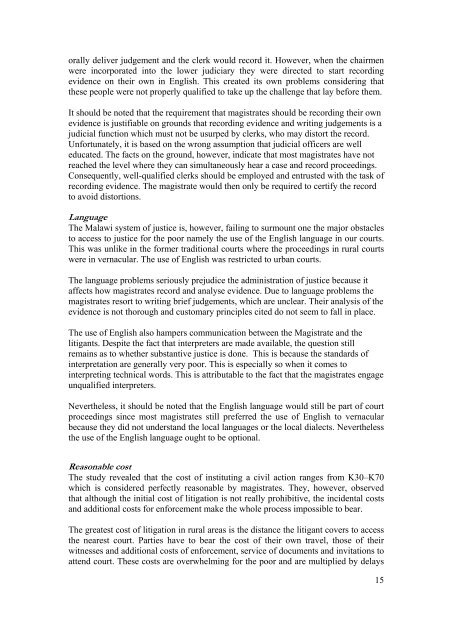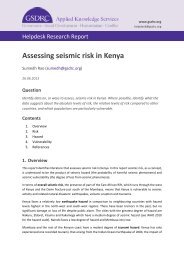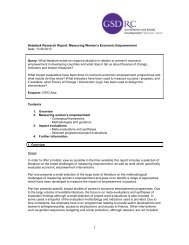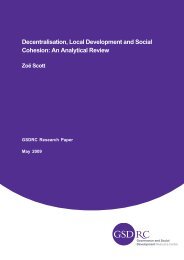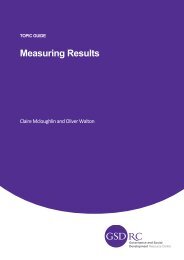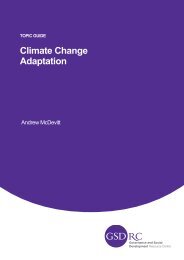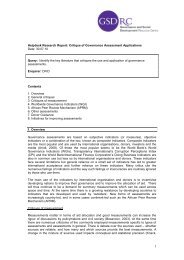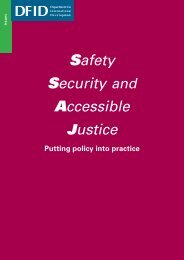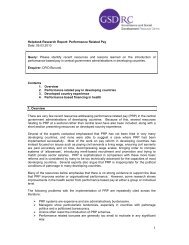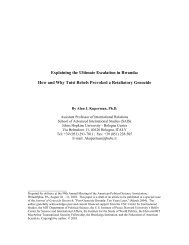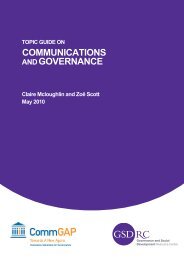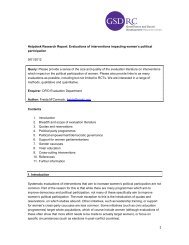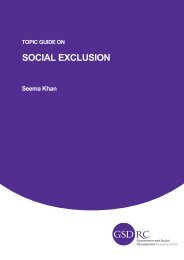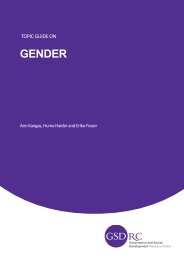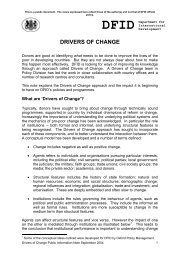ACCESS TO JUSTICE FOR THE POOR OF MALAWI? AN ... - GSDRC
ACCESS TO JUSTICE FOR THE POOR OF MALAWI? AN ... - GSDRC
ACCESS TO JUSTICE FOR THE POOR OF MALAWI? AN ... - GSDRC
- No tags were found...
You also want an ePaper? Increase the reach of your titles
YUMPU automatically turns print PDFs into web optimized ePapers that Google loves.
orally deliver judgement and the clerk would record it. However, when the chairmenwere incorporated into the lower judiciary they were directed to start recordingevidence on their own in English. This created its own problems considering thatthese people were not properly qualified to take up the challenge that lay before them.It should be noted that the requirement that magistrates should be recording their ownevidence is justifiable on grounds that recording evidence and writing judgements is ajudicial function which must not be usurped by clerks, who may distort the record.Unfortunately, it is based on the wrong assumption that judicial officers are welleducated. The facts on the ground, however, indicate that most magistrates have notreached the level where they can simultaneously hear a case and record proceedings.Consequently, well-qualified clerks should be employed and entrusted with the task ofrecording evidence. The magistrate would then only be required to certify the recordto avoid distortions.LanguageThe Malawi system of justice is, however, failing to surmount one the major obstaclesto access to justice for the poor namely the use of the English language in our courts.This was unlike in the former traditional courts where the proceedings in rural courtswere in vernacular. The use of English was restricted to urban courts.The language problems seriously prejudice the administration of justice because itaffects how magistrates record and analyse evidence. Due to language problems themagistrates resort to writing brief judgements, which are unclear. Their analysis of theevidence is not thorough and customary principles cited do not seem to fall in place.The use of English also hampers communication between the Magistrate and thelitigants. Despite the fact that interpreters are made available, the question stillremains as to whether substantive justice is done. This is because the standards ofinterpretation are generally very poor. This is especially so when it comes tointerpreting technical words. This is attributable to the fact that the magistrates engageunqualified interpreters.Nevertheless, it should be noted that the English language would still be part of courtproceedings since most magistrates still preferred the use of English to vernacularbecause they did not understand the local languages or the local dialects. Neverthelessthe use of the English language ought to be optional.Reasonable costThe study revealed that the cost of instituting a civil action ranges from K30–K70which is considered perfectly reasonable by magistrates. They, however, observedthat although the initial cost of litigation is not really prohibitive, the incidental costsand additional costs for enforcement make the whole process impossible to bear.The greatest cost of litigation in rural areas is the distance the litigant covers to accessthe nearest court. Parties have to bear the cost of their own travel, those of theirwitnesses and additional costs of enforcement, service of documents and invitations toattend court. These costs are overwhelming for the poor and are multiplied by delays15


